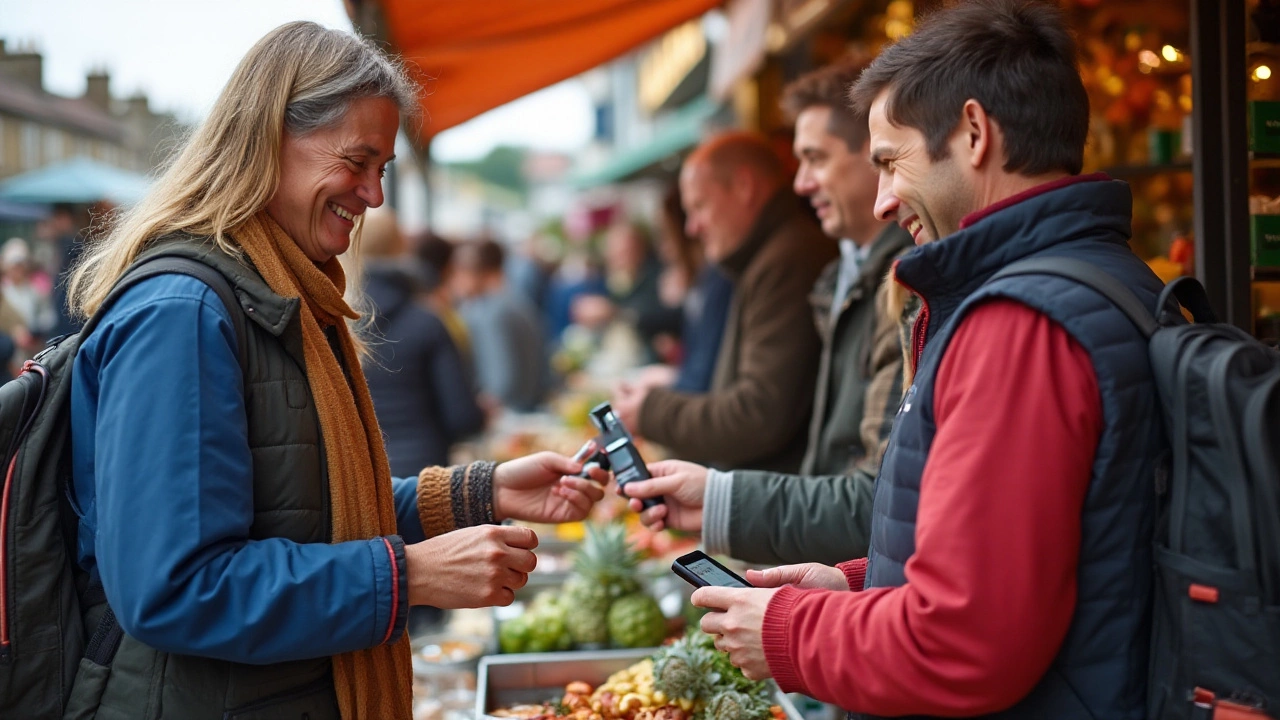As technology sweeps through modern life, many travelers find themselves asking if carrying cash is still necessary for a staycation in England. The landscape of payment methods has shifted dramatically in recent years, but cash has not vanished entirely. For those planning a getaway in England, understanding when and where cash might still play a role can make your trip smoother.
While bustling urban areas and tourist hotspots often support a myriad of digital payment methods, rural regions may still hold onto traditional cash transactions. Small local businesses, which are the soul of many charming villages, might prefer or even require cash.
This article will guide you through navigating the mix of cash and card payments, offering tips and insights that can help you seamlessly enjoy your UK staycation. It’s about finding that sweet spot between the convenience of cashless and the practicality of having coins and notes on hand for those unexpected moments.
- Cashless Payment Trends
- Rural England: Cash vs. Cards
- Small Businesses and Cash Preferences
- Tips for Staycation Travelers
- Balancing Convenience with Preparedness
Cashless Payment Trends
In recent years, England has witnessed a significant transformation in how people handle money, highlighting a major shift towards cashless payment methods. This trend is not just a modern convenience but a reflection of society's growing inclination towards digital solutions. Driven by logical forces like speed, security, and the sheer ease of use, cashless payments have become incredibly popular amongst both locals and travelers. You can notice this trend almost everywhere—whether you're grabbing a coffee in a bustling city or purchasing museum tickets online, the presence of technology in transactions is clearer than ever.
The use of contactless cards and mobile payment apps like Apple Pay or Google Wallet has remarkably increased, offering quick transactions with just a tap or swipe. Such methods are not only quick but also provide an added layer of security, making them attractive alternatives to traditional cash. In fact, according to UK Finance, contactless payments accounted for more than 25% of all payments in the UK in 2022. These trends have driven businesses to adapt rapidly, with many establishments favoring these methods to cater to tech-savvy consumers. As a traveler, embracing this trend could save you time and often lead to more seamless experiences.
Moreover, the rise of digital-only banks like Monzo and Revolut offers travelers options to manage their finances with great convenience while on the move. These banks provide users with real-time notifications, easy currency conversions, and innovative budgeting tools, making it easier than ever to stay on top of travel expenses. With such dynamic options at your fingertips, the allure of cashless transactions becomes even stronger. Barclays and HSBC have also reported an increase in the usage of their mobile banking services, showing that people are not just willing but enthusiastic about embracing digital platforms.
"Cashless payments have not only changed the way we shop, but they've revolutionized our approach to money," says financial analyst Mia White from Finextra Research.
However, while these trends are catching on rapidly, the complete elimination of cash may still take some time. There exist situations where cash remains a preferred choice, especially in rural areas or among smaller businesses that might not have the infrastructure to support digital transactions. Travellers should be mindful that while cities like London or Manchester may potentially allow you to go entirely cashless, other regions might offer diverse experiences. Keeping a modest amount of cash on hand can prove beneficial. Still, understanding these trends and adapting accordingly can vastly improve your staycation experience by ensuring you have access to the best of both worlds.
Rural England: Cash vs. Cards
As you venture away from the bustling cities into the serene landscapes of rural England, a curious balance emerges between cash and digital transactions. The rolling hills of the Cotswolds, the rugged charm of Northumberland, and the picturesque lanes of Devon each offer their unique experiences, often inviting you to step back into a simpler time. In such regions, cash in England remains more than just a backup plan; it’s simply an accepted norm, reminiscent of tradition and trust. These areas showcase a slower pace of life, where the jingle of coins and the rustle of banknotes can convey authenticity, even in today's digital age.
While larger towns and modern districts may flaunt contactless options, smaller villages frequently lean towards cash. This preference can hinge on multiple factors, including connectivity issues and transaction fees that challenge the viability of card machines. It's not uncommon to find quaint little tea rooms or family-run eateries only accepting cash, their interiors echoing stories of yesteryears. A survey by the Federation of Small Businesses in 2023 highlighted that around 15% of businesses in rural UK areas often prefer cash due to lower operating costs.
"Cash provides a fail-safe in areas where connectivity can falter," noted Olivia Harris, a hospitality entrepreneur based in Yorkshire Dales.
Yet, this does not mean cards are obsolete. Many establishments have evolved by combining the old with the new; the flexibility of accepting both cash and cards is increasingly common. Local festivals and farmers' markets, integral to rural life, traditionally accepted cash but have increasingly integrated card readers, adapting to the expectations of a tech-savvy clientele while maintaining their rustic charm.
For UK staycations, understanding this blend can enhance your experience. Consider carrying a mix of payment methods. While credit and debit cards promise convenience and safety, a small stack of notes in your pocket can mean the difference between enjoying a spontaneous local bake sale or missing out. It's enlightening to see how the rural community upholds the spirit of interpersonal interactions, often facilitated by cash exchanges, imbuing transactions with personal touch and accountability.
An interesting aspect of this dynamic is how it shapes tourist behaviour. Travelers often find themselves deliberately choosing to withdraw cash from ATMs before heading into remote areas. Despite the ever-present threat of wallet theft, the reassurance of having cash for emergencies, especially when mobile connectivity wavers, is appealing. It's about striking the right balance: being equipped to embrace both the cashless payments revolution and the traditional reliance on cash.
While the charms of a quintessential English village can tempt anyone to linger, being prepared with the right payment means ensures your stay is both comfortable and indulgent. Next time you find yourself amid the tranquil beauty of rural England, cherish the nuanced dance of cash and cards, as it invites you to engage more intimately with the quaint aspects of local culture and commerce.

Small Businesses and Cash Preferences
Across the quaint villages and serene townships of England, small businesses form the vibrant backbone of local economies. From the cozy tearooms nestled amidst rolling hills to artisan shops tucked away in bustling markets, many such ventures have interesting relationships with cash. For some proprietors, the tactile feel of coins and notes reinforces a sense of traditionalism and security. Cash in England is often cherished here for its immediacy and personal touch, which electronic transactions sometimes lack. Yet, the decision to choose cash over cards goes beyond mere sentimentality. There are practical reasons at play too, such as the avoidance of transaction fees that card payments incur, which can cut into the slim margins these businesses often operate on.
Interestingly, a 2023 report by the British Independent Retailers Association noted that around 35% of small retailers in rural parts of the UK still favor cash payments. This preference is not necessarily a stubborn resistance to change but is often rooted in connectivity issues; some areas still suffer from sporadic internet service, making digital payments unreliable. Additionally, there exists a camaraderie amongst local patrons who prefer to support their community businesses by respecting their modes of operation.
Reasons for Cash Preference
Many independent business owners feel that handling cash gives them better control over their daily income and expenses. Without the need to wait for electronic settlements, cash flow can be managed more efficiently, especially in ventures prone to seasonal fluctuations."Cash payments can be invaluable for our business," says John Hartley, a renowned antique dealer in the Lake District. "It allows us to close transactions swiftly without the worry of network issues or credit card fraud, which is comforting both for us and our regular clients."Furthermore, cash transactions can reduce the risk of chargebacks for items like exclusive or handcrafted goods, where proof of purchase authenticity is crucial. Customers often appreciate the tangibility and the ease cash provides, aligning with an old-school trust system that pervades many of these communities. This system supports an economy thriving not on the rhythm of digital clicks but the straightforward simplicity of a cash till ringing. Despite the march towards a cashless society, the ability of cash to offer direct, fee-free transactions keeps it an attractive option for both business owners and their loyal customers.
Adapting to Change
However, it is undeniable that the wave of digital payments is touching even the most cash-centric establishments. There is a growing realization among many small business owners about the importance of diversifying payment options. While cash remains king in certain contexts, introducing card readers or mobile payment systems can attract a new wave of customers who are less inclined to carry cash. Entrepreneurs are weighing these choices tactically, often opting for flexible payment solutions that offer the benefits of both worlds. Encouragingly, this hybrid approach is seen as an evolution, ensuring traditional businesses remain relevant without losing their unique charm.Tips for Staycation Travelers
Preparing for a staycation in England requires more than just packing your bags and setting off. Although the convenience of digital transactions is predominant, being aware of situations where having cash in England is necessary can make your travel experience more pleasant. Before embarking on your trip, research the areas you'll be visiting. Urban centers like London or Manchester are well-equipped with card payment options, but charming countryside villages may have quaint establishments that operate on a cash-only basis, preserving their traditional charm.
Consider carrying a small amount of cash to cover unexpected expenses. This is particularly useful if you're planning to visit places off the beaten path. Local markets, some historical sites, and small eateries often appreciate or require cash payments.
The National Federation of Retail Newsagents states, "Cash remains a crucial aspect of life in our rural communities and among many small businesses."This emphasizes the importance of having cash on hand in certain scenarios. Balancing card and cash can contribute to a seamless trip, avoiding any awkward situations where digital payments aren't accepted.
Your accommodations might offer valuable insights too. Inquire if there are any local places where cash is preferred over cards. Many boutique hotels and B&Bs are knowledgeable about the area's unique requirements. Having cash in England, even in relatively small amounts, can also help when tipping. Many hospitality workers in smaller establishments still rely on cash tips for a meaningful supplement to their incomes.
Additionally, it's wise to be prepared for any technical disruptions. While rare, internet outages in remote locations can sometimes render card machines useless. Having a backup in the form of cash ensures you're always covered. Airports and train stations often have ATMs, but note that these may charge fees. Planning how much cash you might need in advance can save time and money.
On another note, venture into local shops where you can use cash to engage with the local economy directly. Often, artisan goods and local produce are available at farmers' markets, where a few coins and notes can make all the difference. Plus, these shopping experiences become memorable highlights rather than intimidating hunts for cash. The conversations you might strike up while handing over cash can create meaningful connections, adding to the charm of your staycation.

Balancing Convenience with Preparedness
When embarking on a UK staycation, it is crucial to find the right blend of convenience and preparedness to ensure a pleasant travel experience. While it's undeniable that digital payments have revolutionized the way we transact, neglecting to carry some cash in England could lead to avoidable hiccups along your journey. With digital payments being so common and widely accepted in urban areas and popular tourist hubs, travelers might be tempted to leave their wallets light. But being prepared for any eventuality is all the more important when visiting rural areas or smaller towns. These places often cling to tradition, where cash can be the lifeline for both locals and tourists alike.
Imagine strolling down a picturesque village street only to spot a quaint cafe or boutique brimming with local character, but alas, it relies on cash transactions due to limited internet connectivity. Experiences like these highlight the charm of local businesses, which may operate with a preference for cash. These businesses often inject unique character and flavor into your staycation, which is why having cash on hand can bridge that gap between missed opportunities and unforgettable moments. Therefore, practicing a balanced approach is key—ensuring your digital wallet is paired with some physical currency.
Preparing for the Unexpected
Having a modest stash of local currency is beneficial not just for transactions, but for emergencies as well. Consider situations where digital systems might be temporarily down, or small amenities such as a public restroom where only coin payments are accepted. The fact is cash is more than just a payment tool; it’s a form of security. In such cases, having a backup might save the day and allow you to continue enjoying your moments without undue stress. It might also be useful to keep an eye on currencies. Per the latest Bank of England report, a small percentage of businesses (around 10%) still exclusively accept cash, often for practical or economic reasons."Our study indicates that while contactless payments continue to rise, cash remains a vital payment choice for many small and localized businesses." – Bank of England
Tips for Travelers
Think about the upcoming journey and plan accordingly. Try to estimate how much cash you might actually need, taking into account factors like the duration of your stay, the size of the group, and the distance to the nearest cash point. A practical suggestion would be to carry a small amount each day rather than keeping all your cash on you. Spread it across different pockets or storage areas in your luggage.For those who travel often, devising a digital-cash contingency plan could be wise. This involves organizing a mix of digital payment apps, regular credit or debit cards, and a small purse of physical cash. Such an approach ensures that irrespective of the situation, you're equipped to handle monetary transactions smoothly. After all, being prepared can make your entire staycation infinitely more enjoyable, allowing you the peace of mind to fully immerse yourself in the beauty and charm of your surroundings.

Menu